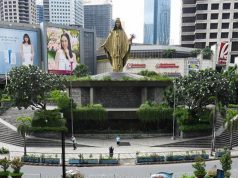
MANILA – There isn’t a day when the news doesn’t include reports of some cop getting involved in some incident that requires investigation by the independent prober of the Philippine National Police, its Internal Affairs Service.
The woefully undermanned and ill-equipped PNP-IAS, however, only has 22 vehicles nationwide, and lacks hundreds of simple office chairs, computers and laptops so that some personnel sometimes have to write report in Internet shops.
According to Sen. Grace Poe, if not enough funds are poured in to ensure IAS is modernized, the Philippine National Police’s efforts to rid their ranks of scalawags—which is said to make up two percent of the 180,000-man force—will not succeed.
Poe, who has publicly declared her full support to the institutional watchdog of the police service to address misdeed in the police force, said the independent IAS is “spread too thinly and with little resources to run after policemen who have betrayed their oath and disgraced their uniform.”
“To cite an example, there are only two IAS personnel in a big city like Cebu, which is the country’s biggest metropolis outside Metro Manila. There is just one IAS man assigned in Cagayan de Oro. Zamboanga City also has one,” said Poe, vice chairperson of the Senate committee on public order and dangerous drugs.
“Buti nga ang mga ito may IAS office, yung iba wala. There is no IAS office in big provinces such as Agusan del Sur, North Cotabato, Saranggani, to name a few,” Poe added.
Budget boost eyed
The senator said she was considering introducing an amendment to the proposed P135.8-million budget of the IAS for 2018 that will reflect appropriations to buy the necessary equipment to effectively carry out their mandate.
In addition to manpower woes, IAS has been plagued by equipment shortages, from cars to computers and even furniture, Poe said.
“Sa kabuuan, 22 lang ang laptops ng IAS sa buong bansa. Yung anim, sirain na at outdated pa. Kaya yung ibang IAS personnel, doon sa internet shop gumagawa ng report [In all, IAS only has 22 laptops nationwide, many of which are oudated or prone to breakdowns. So some IAS personnel do their reports in Internet shops],” Poe said.
“Sa desktop computers naman, 181 lang meron ang IAS pero lampas kalahati, kung hindi sira, naghihingalo na [As for desktop computers, they have 181, but more than half are either in disrepair or are nearing attrition],” Poe said.
Poe said the 342 chairs issued to IAS are not enough to seat all of the 704 uniformed and 80 contractual personnel assigned to it.
As to manpower, Poe, citing an official PNP report to her office, said IAS only has 22 lawyers, “which cripple its ability to prepare legal briefs that are indispensable in preparing administrative cases against rogue policemen.”
“Isipin mo na lang [Imagine that], one IAS lawyer for every 8,181 policemen. Karamihan pa sa mga abogado, naka-base sa Camp Crame [Most of the lawyers are based in Camp Crame],” she said.
“So with this shortage in men and equipment, how can IAS effectively police the police?” Poe asked.
Under Executive Order 101 issued in 1999 to operationalize the IAS, the latter is mandated to serve as the “institutional watchdog agency” for the national police.
But such role is “subverted by the across-the-board lack in logistics and personnel,” Poe said.
“One proof of this is that since 1999, [IAS has not had any capital outlay fund]. For 18 years, [there was no] specific appropriations to buy the likes of computers,” she said.
Poe said 16 provinces have only one IAS personnel each. “Paano nya lalabanan ang mga scalawags doon kung lone ranger sya [How can that lone ranger fight the scalawags]?” Poe said.
She was referring to Bohol, Negros Oriental, Misamis Occidental, Bukidnon, Sulu, Maguindanao, Tawi-Tawi, Lanao del Sur, Dinagat, Agusan Norte, South Cotabato, Sultan Kudarat, Zamboanga del Sur, Zamboanga Norte, Zamboanga Sibugay and Batanes as having one IAS personnel each.
Poe said IAS needs to be given more resources especially at this time when it has been ordered to review alleged extrajudicial killings.
As per latest report, 1,850 policemen are being probed for possible violation of procedures during anti-drug operations.
PNP Director General Ronald “Bato” dela Rosa was quoted as saying that at least two percent of policemen were “scalawags.”
“If that is equivalent to 4,000 men paid by taxpayers to carry guns, then that should be a great concern to citizens, and their separation from service, and prosecution, if warranted, should be a priority of General Bato,” Poe said.









